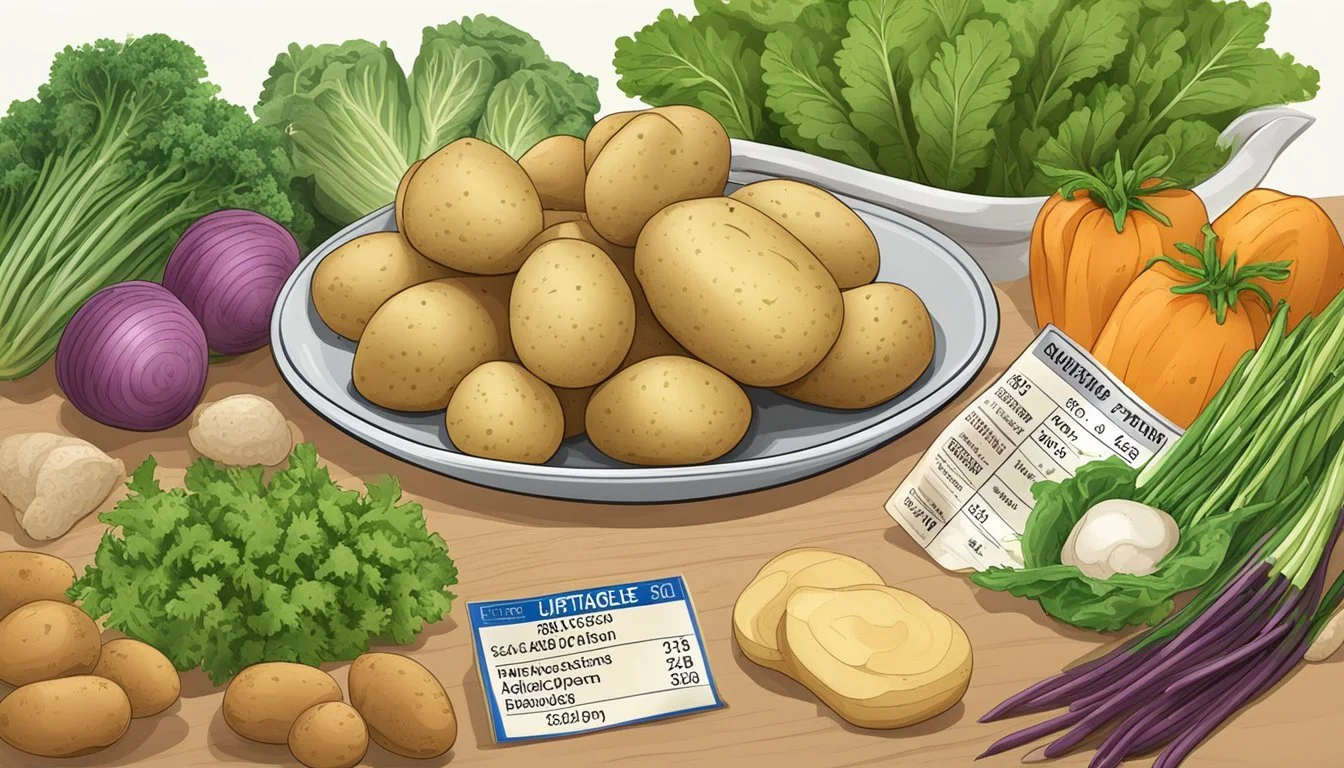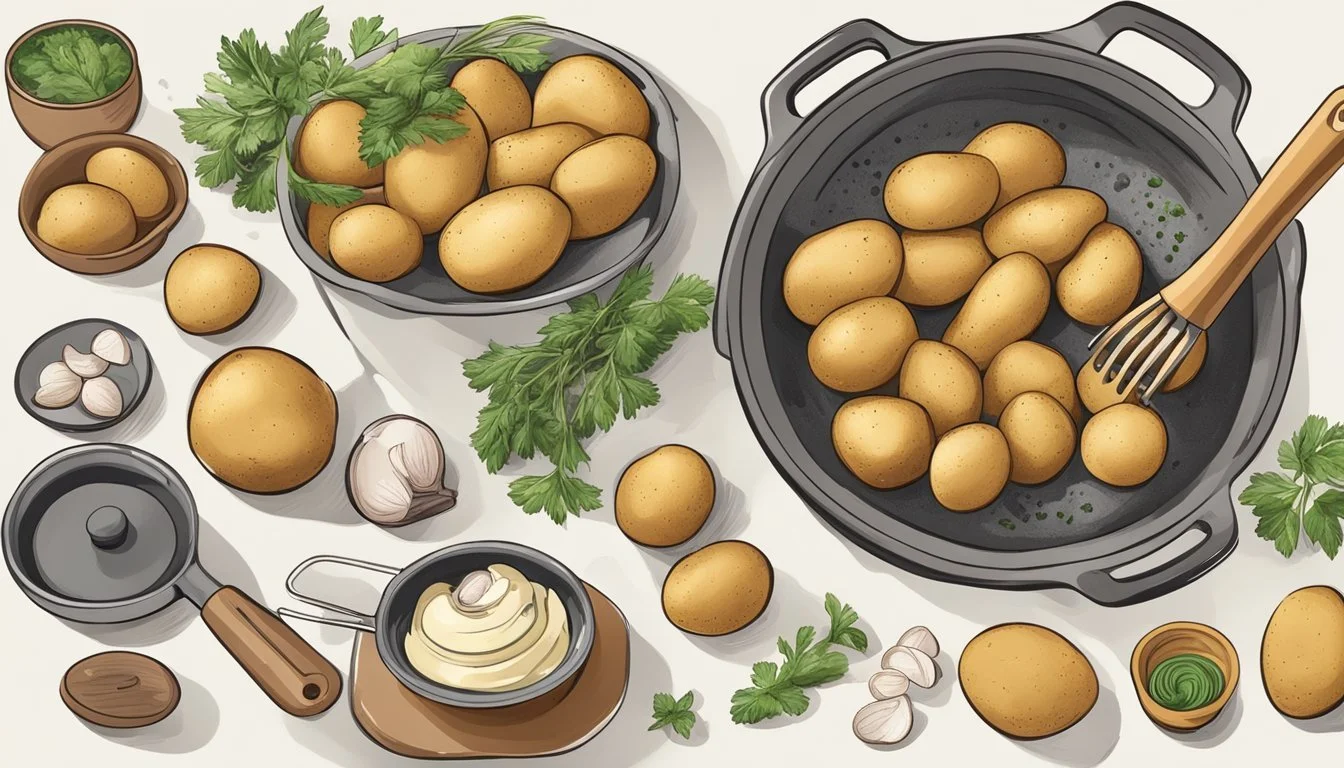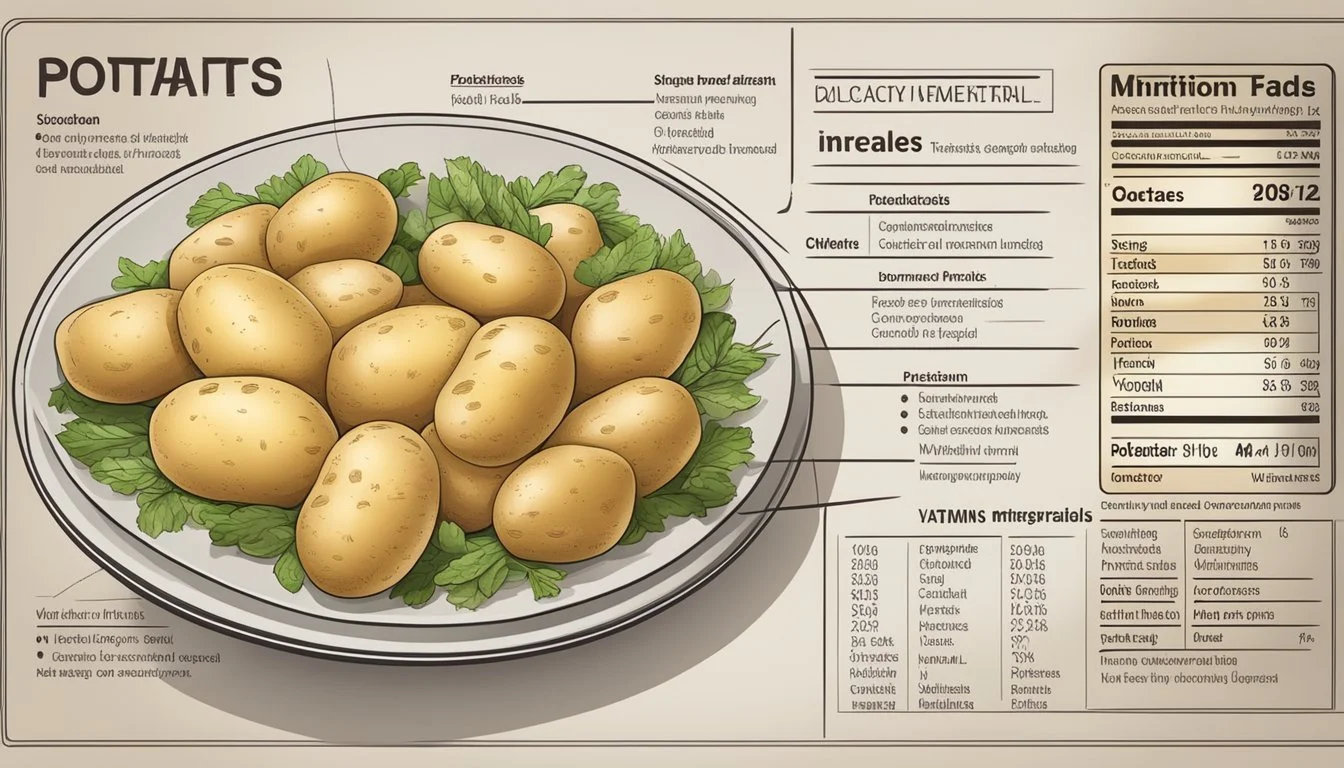Are Potatoes Unhealthy?
Debunking Common Myths
Potatoes (What wine goes well with potatoes?) are a staple food in many diets around the world, known for their versatility and capacity to be cooked in numerous ways. As a vegetable, they are packed with essential nutrients that can offer various health benefits. A medium-sized russet potato baked with skin, for instance, is a source of potassium, vitamin C, vitamin B6, fiber, and protein. These nutrients are vital for the body's function, supporting everything from muscle health to immune response.
Despite their nutritional content, the healthiness of potatoes can come into question when considering the broader context of their preparation and consumption. Often consumed as fried or processed foods like french fries and chips, potatoes in these forms are associated with less healthy eating habits. These cooking methods can add excessive fats and salts, overshadowing the inherent nutritional benefits of the vegetable.
The debate on whether potatoes contribute to a healthy diet has prompted dietitians and nutrition experts to examine their impact on blood sugar levels and satiety. While some forms of potatoes may lead to rapid increases in blood sugar, other preparation methods, such as boiling, can alter the starches in potatoes to make them digest more slowly. This indicates that the way potatoes are prepared and consumed plays a critical role in how they affect health and should be considered in the context of an overall balanced diet.
Nutritional Profile of Potatoes
Potatoes are a complex carbohydrate source, packed with essential vitamins, minerals, and dietary fiber. Their nutritional content can vary significantly depending on the variety and preparation method.
Macronutrient Breakdown
A medium-sized (173g) baked russet potato contains approximately:
Calories: 168
Protein: 5 grams
Total Fat: 0 grams
Total Carbohydrates: 37 grams
Starch: Makes up the majority of the carbohydrate content in potatoes.
Vitamin and Mineral Content
Potatoes are an excellent source of several vitamins and minerals, particularly:
Vitamin C: Provides about 25% of the daily value (DV)
Vitamin B6: Approximately 30% of the DV
Potassium: Offers around 25% of the DV, which is higher than the amount found in bananas
These vitamins and minerals are vital for immune system function, energy metabolism, and blood pressure regulation.
Fiber and Resistant Starch
The fiber content in potatoes contributes to digestive health, with a medium-sized potato offering:
Fiber: About 4 grams, which is 16% of the DV
Potatoes also contain resistant starch, especially when cooled after cooking. This type of starch acts similar to fiber, promoting gut health and satiety.
Potatoes in a Healthy Diet
Potatoes, often categorized as starchy vegetables, come in various types that provide a rich array of nutrients. Their effect on health can vary depending on their type, preparation, and consumption within the diet.
Varieties and Their Nutrient Values
Different potato varieties offer distinct nutrient profiles. Russet and white potatoes are high in starch and provide essential nutrients like vitamin C, vitamin B6, and potassium. Red and yellow potatoes contain similar vitamins but with a little less starch. Purple potatoes boast antioxidants that are responsible for their color. Sweet potatoes have high fiber, vitamin A, and vitamin C content. Here's a snapshot of their nutrient values:
Variety Vitamin C Vitamin B6 Potassium Fiber Antioxidants White Moderate High High Moderate Low Russet Moderate High High Moderate Low Red/Yellow Moderate High High Moderate Low Purple Moderate Moderate Moderate Moderate High Sweet Potato High Moderate Moderate High Moderate
Role in Weight Management
Potatoes have a high satiety index, meaning they can help you feel full longer. However, how they're prepared plays a crucial role in their impact on weight gain. Boiling, baking, and roasting are healthier preparation methods that don’t add extra calories like frying does. Substituting potatoes for other carbohydrate sources like beans or rice occasionally can vary nutrient intake and aid in satiety.
Impact on Blood Sugar Levels
The glycemic load and glycemic index are measures that describe how food affects blood sugar levels. Potatoes have a reputation for a high glycemic index, particularly when boiled or baked, which can lead to quick rises in blood sugar. However, eating potatoes with a source of healthy fat, protein, or fiber can mitigate this effect and improve blood sugar control. The body's response to potatoes can also vary based on an individual's overall diet and metabolism.
Potential Health Concerns
When considering the health aspects of potatoes, it's important to address specific potential risks associated with their consumption which may impact certain individuals or groups, especially when potatoes are consumed improperly or in excess.
Glycoalkaloids and Toxicity
Potatoes naturally contain glycoalkaloids, toxic compounds that can lead to food poisoning if consumed in high amounts. The most well-known glycoalkaloids in potatoes are solanine and chaconine, which are more concentrated in green potatoes or those that have sprouted. Consumption of potatoes high in glycoalkaloids can result in symptoms such as nausea, headaches, and digestive distress.
High Glycemic Index and Diabetes
The glycemic index (GI) is a measure of how quickly a food can elevate blood sugar levels. Potatoes generally have a high GI, which can lead to rapid spikes in blood sugar levels. For individuals with diabetes, managing blood sugar is crucial, and consistently eating high-GI foods may complicate blood sugar control, potentially increasing the risk of diabetes-related complications.
Link to Chronic Diseases
Regular consumption of potatoes, especially in processed forms like fries or chips, is sometimes associated with an increased risk of chronic diseases such as heart disease and cancer. These health risks are often linked not only to the potatoes themselves but to the cooking methods and additives used, like high levels of unhealthy fats and sodium. However, the association between potato consumption and chronic disease risk often involves many dietary and lifestyle factors, not potatoes alone.
Cooking and Processing Effects
The method by which potatoes are prepared significantly impacts their nutritional value and can lead to the formation of unhealthy byproducts. Factors such as temperature, cooking time, and added ingredients play a crucial role.
Impact on Nutrient Retention
Boiled Potatoes: Boiling potatoes can cause some water-soluble nutrients, like vitamin C and certain B vitamins, to leach into the water. However, they generally retain more of their nutrient profile compared to other cooking methods, especially if consumed with their skins.
Steamed Potatoes: This method helps preserve most nutrients due to minimal contact with water and reduced cooking times.
Baked/Roasted Potatoes: Baking and roasting at high temperatures for longer durations can reduce nutrient content; nonetheless, these methods do not involve immersion in water, which helps in retaining water-soluble vitamins.
Fried Potatoes: Including formats like french fries and potato chips, frying significantly reduces nutrient content due to the high temperatures and exposure to fat.
Cooking Method Nutrient Retention (Vitamin C) Nutrient Retention (B vitamins) Boiled Medium Medium-High Steamed High High Baked/Roasted Low-Medium Medium Fried Low Low
Formation of Unhealthy Byproducts
Acrylamide Formation: In potato chips and french fries, the combination of high temperatures and the potatoes' natural sugars can result in the formation of acrylamide, a potential carcinogen.
Trans Fats: Some fried potatoes may also contain trans fats, depending on the type of oil used, which are associated with increased risk of heart disease.
High Sodium Levels: Potato products, especially processed ones like chips and commercial french fries, often have high sodium content, which can lead to health problems when consumed in excess.
Potatoes' health profile is significantly determined by the cooking method. Steaming and boiling are preferable for nutrient retention, whereas frying, especially at high temperatures, can introduce unhealthy components.
Practical Tips for Consumption
Potatoes are a versatile staple in various cuisines, but their healthfulness can vary greatly depending on preparation methods and portion sizes. Consuming potatoes in moderation and using healthy cooking methods can ensure they form part of a balanced diet.
Intake: Dietitians often recommend seeing potatoes as a source of carbohydrates rather than a vegetable, which means they should replace other carb-rich foods like pasta or rice rather than greens like broccoli or tomatoes.
Cooking Methods: Opting for baked, roasted, or boiled potatoes over fried forms helps to maintain their nutritional value. For example, to make healthy roasted potatoes:
Combine cubed potatoes with olive oil and desired herbs like rosemary or paprika.
Season with a pinch of salt and pepper.
Arrange in a single layer on a baking tray and roast until tender.
Recipes: Variety is key. Enjoy the diverse range of potatoes, from the starchy russet to waxy red, purple, fingerling, and new potatoes. Each type lends itself well to different recipes—russets for fluffy mashed potatoes, and firmer types like reds for salads.
Healthy Additions and Substitutions:
Use olive oil instead of butter to reduce saturated fat.
Choose Greek yogurt over sour cream for added protein and fewer calories.
Season with herbs and spices rather than excess salt to lower sodium intake.
Portion Control: Moderation is essential; a medium-sized potato is often sufficient for one serving. Pairing potatoes with fiber-rich vegetables can aid in digestion and help maintain a feeling of fullness.
Remember that the key to a healthy diet is balance, and potatoes can contribute nutritional value when prepared thoughtfully.
Comparative Foods
When considering the healthfulness of potatoes, it is useful to compare them to other starchy and non-starchy vegetables, as well as grains. These comparisons can highlight the nutritional differences and help inform dietary choices.
Starchy versus Non-Starchy Vegetables
Starchy vegetables, such as potatoes, corn, and peas, contain more carbohydrates and calories compared to non-starchy vegetables like greens or carrots. They are an important energy source and also provide essential nutrients. For example:
Potatoes: A medium russet potato contains approximately 37 grams of carbs and 4 grams of fiber.
Sweet potatoes: Although also starchy, they offer beta-carotene and slightly higher fiber content.
Beans: These are high in fiber and protein, making them a nutritious starchy option.
On the other hand, non-starchy vegetables typically have fewer calories and carbs but are rich in various nutrients. They can be consumed in larger quantities without significantly affecting caloric intake.
Potatoes versus Grains
Comparing potatoes to grains, both are significant sources of carbohydrates, but their nutrient profiles differ:
Whole Grains: Generally higher in fiber and contain a wider variety of nutrients than potatoes. Consuming whole grains is associated with several health benefits, including reduced risk of heart disease.
Refined Grains: These have most of the fiber and nutrients removed. A potato can often be a healthier choice than products made with refined grains because it provides more nutrients and fiber.
Each food has distinct nutritional values and could be included as part of a balanced diet depending on individual nutritional needs.
Myths and Misconceptions
Potatoes have long been surrounded by myths regarding their impact on health. One common misconception is that potatoes are inherently unhealthy and contribute to weight gain and diabetes. Contrary to this belief, potatoes are a nutrient-dense food that, when prepared healthily, can be a beneficial part of a balanced diet.
Nutrition: They are a significant source of vitamins especially Vitamin C, and minerals like potassium.
Health Benefits: Potatoes contain carotenoids and resistant starch, which may support health in various ways.
Despite being part of the nightshade family, which some people believe can be inflammatory, there is no substantial evidence that potatoes cause harm when consumed as part of a varied diet.
The fear that potatoes contribute to diabetes may be due to their glycemic index (GI). However, the GI of potatoes can vary greatly depending on the type, preparation, and what they are consumed with. Additionally, the presence of resistant starch, particularly in cooled potatoes, can help moderate blood glucose levels.
Furthermore, the claim that potatoes lead to weight gain overlooks the context of overall diet and lifestyle. No single food is responsible for weight gain. Overconsumption and preparation methods, like frying, contribute to this misconception.
In summary, nutrition is complex and individualized. Potatoes can fit into a healthy eating pattern when consumed in moderation, adopting cooking methods like boiling, baking, or roasting, and incorporating a variety of other vegetables and foods.
Regulatory and Advisory Perspectives
Regulatory agencies and health advisory bodies provide guidance based on the nutritional content and health implications of potato consumption. Dietitians and nutrition experts often assess potatoes for their health benefits and role in diet and blood sugar control.
The USDA includes potatoes in the vegetable group, indicating their potential as part of a balanced diet. Potatoes are considered a source of essential nutrients:
Vitamin C: for immune function and skin health
Potassium: for blood pressure regulation
Dietary Fiber: aids in digestion and satiety
B Complex Vitamins: crucial for energy metabolism
However, concerns are raised regarding potatoes' glycemic index (GI), which measures how quickly foods raise blood sugar levels. Boiled potatoes have a high GI, potentially affecting blood sugar control, especially important for individuals with diabetes.
Moderation is key, as highlighted by nutrition authorities. The American Heart Association (AHA) suggests limiting foods high in sodium and preparing potatoes without adding excessive salt or fat to maintain heart health. Here is a brief on their perspective concerning potato nutrients:
Nutrient Role AHA Guidance Sodium Blood pressure and fluid balance Opt for low-sodium preparation methods Carbohydrates Provides energy Choose fiber-rich varieties and watch portion size
Professional dietitians often advise including potatoes in moderation within balanced diets, considering preparation methods and portion sizes to optimize health benefits.








